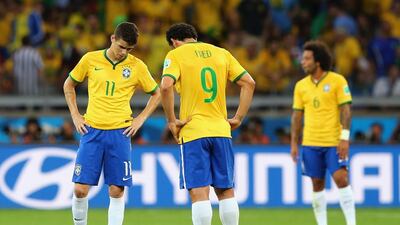A sense of perspective is often inconvenient. Wins are not always as momentous or defeats as crushing as they can seem at the time.
Usually there is a chance for redemption or rehabilitation, but not this time.
After the most stunning result in World Cup history, even the knee-jerk reactions scarcely seemed excessive.
The GloboEsporte newspaper branded Brazil’s 7-1 loss to Germany “the disgrace of all disgraces” and “the worst defeat of all time”.
“Congratulations to the 1950 World Cup runners-up,” said Rio de Janeiro’s Extra newspaper. “You were always accused of being responsible for the greatest humiliation in Brazilian football history. But now we know what humiliation really means.”
It was hard to disagree.
Click here to visit The National’s World Cup 2014 landing page
Stand-in captain David Luiz apologised to an entire nation, while manager Luiz Felipe Scolari said it the worst day of his life.
It was that startling, that shocking; it was the sort of score to bring about a period of soul-searching.
The inquests could be far-reaching, stretching down into the world of youth development.
Brazil have been a byword for talent, producing gifted players more consistently than any other country, but a football-crazy land of 200 million people had a squad that was strangely short of elite performers.
Deprived of Neymar’s flair and Thiago Silva’s solidity against Germany, the shortcomings of others were exposed.
A valid criticism – and one that cannot be explained by the demands of European clubs as high-class players will always find a taker – is that Brazil produce the same sorts of players.
They have attacking full-backs who do not devote enough attention to defending – Marcelo was dismal and Maicon little better against Germany.
They also develop combative, energetic midfielders who are not creative enough.
Brazil gave the ball away too often throughout the World Cup, and Luiz Gustavo and Fernandinho were out-passed and outclassed by Toni Kroos and the German technicians.
When they struggled, Scolari sent for Paulinho, a similar midfielder, because there was no playmaker, no specialist distributor.
A freak result in one respect was a worrying one in another. Brazil, more than any other country, ought to have strength in depth, and a side built around pragmatic principles ought at least to be able to defend.
Instead, Brazil were a shambles and it is inconceivable that Scolari will keep his job as too many mistakes were made.
Hindsight was not required to say that his squad should have contained an alternative fantasista, whether Lucas Moura, Kaka, Robinho or even Ronaldinho, in case anything happened to Neymar.
Overlooking the Atletico Madrid defenders Miranda and Filipe Luis and Bayern Munich’s Rafinha suggested he paid too little attention to club football.
The failures of Fred and Jo – even their names betray an un-Brazilian dullness that hints at the bluntness of the forward line – were predictable.
Then there is the semi-fit Diego Costa, who, even though he struggled for Spain, should have Brazil rueing the one that got away.
The striker is not a one-off, either, so the Brazilian football association should put greater efforts into ensuring their players line up for the Selecao, rather than being naturalised by other countries.
Double international Costa will not play for Brazil again. Nor, in all probability, will some of the culprits of the Belo Horizonte humiliation.
Goalkeeper Julio Cesar is almost 35. Right-backs Dani Alves, who was strangely dropped, and Maicon are the wrong side of 30. Fernandinho was always a short-term answer to a midfield problem. Fred and Jo ought to make way for Leandro Damiao, Alexandre Pato or, frankly, anyone else.
It would be a populist gesture for a new manager to omit many more. If Brazil careers come to an end, it is not simply an issue of personnel.
Some say the last truly entertaining Brazil team was in 1982, though by everyone else’s standards, the sides of 1998, 2002 and 2006 had plenty of aesthetic appeal. Neymar apart, the class of 2014 did not.
This was not jogo bonito. A distinctive style of play is not a prerequisite but, more than most, Brazil have the chance to play a brand of football that is both technically accomplished and attacking.
Germany, who have reinvented themselves in the past decade, have proved it is possible. So, too, did Chile, who were distinctly unfortunate not to beat Brazil in the round of 16.
The Selecao could be forgiven for wishing they had lost to their local rivals. It would have spared them a historic low.
sports@thenational.ae
Follow us on Twitter @SprtNationalUAE


